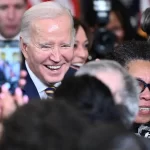- Home
- Billionaires
- Investing Newsletters
- 193CC 1000
- Article Layout 2
- Article Layout 3
- Article Layout 4
- Article Layout 5
- Article Layout 6
- Article Layout 7
- Article Layout 8
- Article Layout 9
- Article Layout 10
- Article Layout 11
- Article Layout 12
- Article Layout 13
- Article Layout 14
- Article Sidebar
- Post Format
- pages
- Archive Layouts
- Post Gallery
- Post Video Background
- Post Review
- Sponsored Post
- Leadership
- Business
- Money
- Small Business
- Innovation
- Shop
Recent Posts
Nikki Haley Falters in Nevada Primary as Trump Looms Large: A Glimpse into GOP Dynamics

In a surprising turn of events, the former South Carolina Governor and prominent Republican figure, Nikki Haley, faced a setback in Nevada’s Republican primary on Tuesday. Contrary to expectations, Haley failed to secure victory, with the “none of these candidates” option emerging as the dominant choice, garnering nearly double the votes. This outcome raises eyebrows and sparks discussions about the state of the Republican Party as it navigates through a complex political landscape.
The Nevada primary, traditionally an important battleground for Republican candidates, witnessed an unexpected twist with the overwhelming support for the “none of these candidates” option. While Haley’s campaign had generated considerable buzz leading up to the primary, her failure to resonate with Nevada voters underscores the challenges facing GOP contenders in the post-Trump era.
Analysts attribute Haley’s inability to clinch victory to a multitude of factors, including her perceived distance from the grassroots sentiments within the Republican base. Despite her credentials as a former governor and ambassador to the United Nations, Haley’s attempts to position herself as a unifying figure within the party may have fallen short in a state where the specter of Donald Trump continues to loom large.
The surge in support for the “none of these candidates” option reflects a broader sentiment of dissatisfaction among certain segments of the Republican electorate. Some voters express disillusionment with the traditional political establishment and seek alternatives that align more closely with their ideological preferences. This trend underscores the ongoing struggle within the GOP to reconcile competing factions and ideologies.
However, it is crucial to contextualize the significance of the Nevada primary within the broader framework of the Republican nomination process. Despite the attention garnered by Haley’s performance, the outcome of the primary holds limited implications for the allocation of delegates. Nevada’s 26 GOP delegates are set to be awarded in Thursday’s caucuses, where former President Donald Trump is widely expected to dominate.
The looming presence of Trump in Nevada’s political landscape poses a formidable challenge for aspiring Republican candidates. With his continued influence over the party base, Trump exerts a gravitational pull that shapes the dynamics of GOP primaries across the country. His endorsement remains a coveted asset, capable of propelling candidates to victory or consigning them to defeat.
For Haley and other contenders vying for the Republican nomination, navigating the shadow cast by Trump presents a delicate balancing act. While some candidates seek to embrace Trump’s legacy and court his supporters, others advocate for a more moderate approach, emphasizing unity and pragmatism. The Nevada primary serves as a microcosm of this broader struggle for the soul of the Republican Party.
In the aftermath of the primary, Haley’s campaign faces critical questions about its viability and strategic direction. The setback in Nevada underscores the formidable obstacles confronting Haley as she seeks to build momentum and rally support ahead of upcoming primaries. Despite her stature within the party, Haley must confront the harsh realities of a political landscape transformed by the tumultuous legacy of the Trump presidency.
As attention shifts to Thursday’s caucuses, all eyes remain on the enduring influence of Donald Trump in shaping the trajectory of the Republican Party. With the prospect of Trump securing a decisive victory in Nevada, the dynamics of the GOP nomination race are poised for further upheaval. The outcome of the caucuses will offer valuable insights into the evolving dynamics of Republican politics and the enduring legacy of the Trump era.
In conclusion, Nikki Haley’s stumble in the Nevada primary highlights the complex dynamics at play within the Republican Party as it grapples with the legacy of Donald Trump. While the outcome of the primary may appear insignificant in delegate allocation, it serves as a poignant reminder of the challenges facing GOP contenders in navigating a political landscape defined by competing factions and ideologies. As the race for the Republican nomination unfolds, the influence of Trump continues to cast a long shadow, shaping the contours of the party’s future trajectory.
Recent Posts
Categories
- 193cc Digital Assets2
- 5G1
- Aerospace & Defense46
- AI37
- Arts3
- Banking & Insurance11
- Big Data3
- Billionaires449
- Boats & Planes1
- Business328
- Careers13
- Cars & Bikes76
- CEO Network1
- CFO Network17
- CHRO Network1
- CIO Network1
- Cloud10
- CMO Network18
- Commercial Real Estate7
- Consultant1
- Consumer Tech180
- CxO1
- Cybersecurity68
- Dining1
- Diversity, Equity & Inclusion4
- Education7
- Energy8
- Enterprise Tech29
- Events11
- Fintech1
- Food & Drink2
- Franchises1
- Freelance1
- Future Of Work2
- Games141
- GIG1
- Healthcare78
- Hollywood & Entertainment186
- Houses1
- Innovation42
- Investing2
- Investing Newsletters4
- Leadership65
- Lifestyle11
- Manufacturing1
- Markets20
- Media193
- Mobile phone1
- Money13
- Personal Finance2
- Policy567
- Real Estate1
- Research6
- Retail1
- Retirement1
- Small Business1
- SportsMoney33
- Style & Beauty1
- Success Income1
- Taxes2
- Travel10
- Uncategorized8
- Vices1
- Watches & Jewelry2
- world's billionaires418
Related Articles
Netflix Secures 2027 and 2031 Women’s World Cup Rights
Netflix has clinched an exclusive streaming deal for the next two FIFA...
By 193cc Agency CouncilDecember 20, 2024Meta Fixes Facebook, Instagram, WhatsApp Outages
Meta, the parent company of Facebook, Instagram, and WhatsApp, faced significant outages...
By 193cc Agency CouncilDecember 12, 2024Roy Jones Jr. Confident He Can Beat Jake Paul, Issues Challenge
Boxing legend Roy Jones Jr. has made waves by declaring that he’s...
By 193cc Agency CouncilDecember 11, 2024Tsunami Warning Lifted After 7.0 Quake Off California Coast
A tsunami warning that affected large portions of northern California and Oregon,...
By 193cc Agency CouncilDecember 6, 2024















Leave a comment